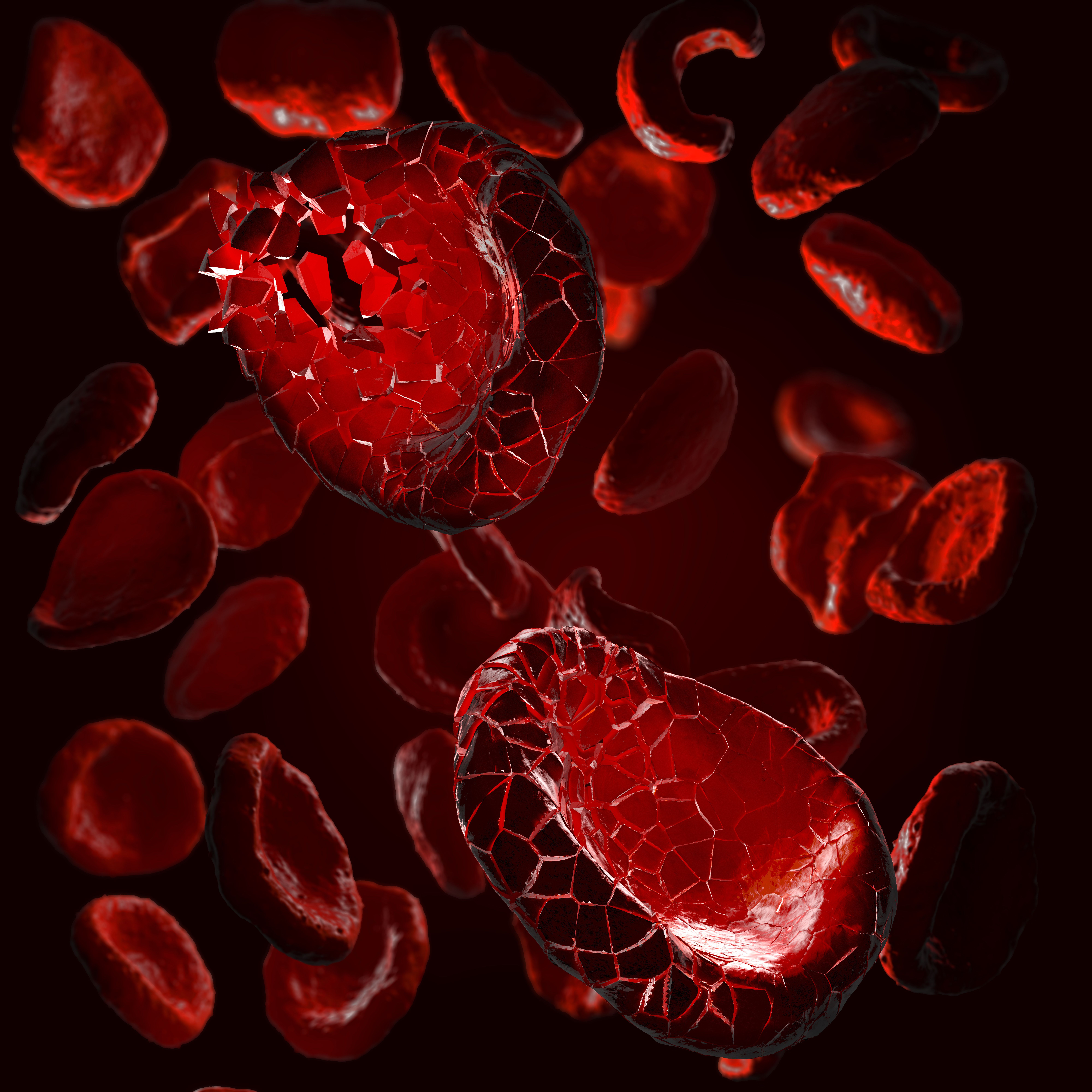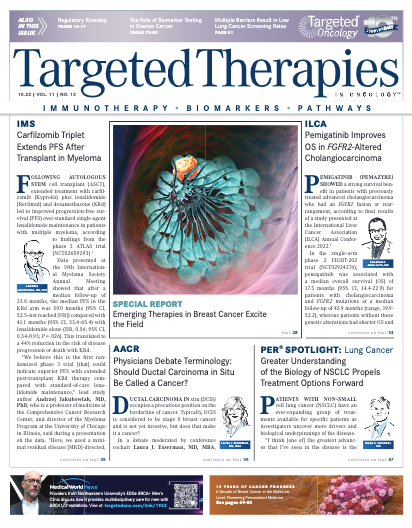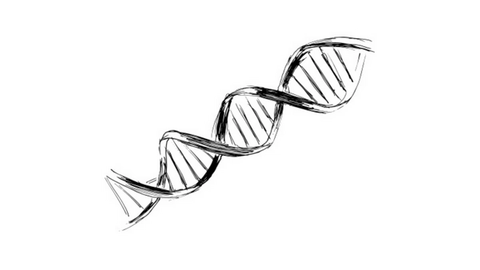Bispecifics Show Promise Against Hematologic Malignancies
Additional data emerged demonstrating the value of blinatumomab not only in patients with relapsed acute lymphoblastic leukemia but also in those with detectable minimal residual disease.

In December 2014, the FDA first granted accelerated approval to blinatumomab (Blincyto), a bispecific antibody simultaneously targeting CD19 on malignant B lymphocytes and CD3 on nonmalignant T lymphocytes, for patients with relapsed or refractory B-cell precursor acute lymphoblastic leukemia (ALL).1 Subsequently, additional data emerged demonstrating the value of blinatumomab not only in patients with relapsed ALL but also in those with detectable minimal residual disease.
Blinatumomab has the distinction of being the first bispecific antibody approved to treat cancer. Administration of blinatumomab is cumbersome; due to its short half-life, it requires continuous intravenous (IV) infusion. Because of the risk of cytokine release syndrome (CRS), patients receiving blinatumomab require admission to the hospital for monitoring during the early weeks.
In recent years, innovative scientists have been developing novel bispecific antibodies with different targets, such as CD20, B-cell maturation antigen (BCMA), and GPRC5D, making them potentially effective in a wider array of diseases like lymphoma and multiple myeloma. They have longer half-lives, thereby eliminating the need for continuous IV infusions, and they are being developed for IV and subcutaneous administration.
We are starting to see fruits of this labor. Recently, the CD20×CD3 bispecific antibody mosunetuzumab (Lunsumio) received conditional approval in Europe for patients with relapsed follicular lymphoma based on an overall response rate of 80% and complete response rate of 60% in a phase I/II trial (NCT02500407).2 On August 24, 2022, the BCMA×CD3 bispecific antibody teclistamab received conditional approval in Europe for patients with multiple myeloma who have received at least 3 prior therapies.3 In these patients teclistamab produced an overall response rate of 63%, including a 59% rate of very good partial response or better, and a median progression-free survival of 11 months. According to news reports, both mosunetuzumab and teclistamab are being reviewed by the FDA.
The incorporation of bispecific antibodies into the treatment arsenal for hematological malignancies is not going to end soon. Additional studies have demonstrated significant benefit of these products in different diseases and scenarios. The CD20×CD3 bispecifics glofitamab and epcoritamab have significant activity in diffuse large B-cell lymphoma.4,5 The GPRC5D×CD3 bispecific talquetamab has activity in multiple myeloma and has been granted a breakthrough designation by the FDA.6 With the efficacy rates we are seeing in heavily pretreated patients, I would predict that these drugs will find their way into earlier lines of therapy.
There is going to be a learning curve for all of us to be able to deliver these bispecifics to patients safely and efficiently. Bispecific antibodies cause CRS, characterized by fevers and sometimes hypotension, hypoxia, and organ dysfunction. CRS tends to occur within the first month of therapy. Although physicians who administer a lot of blinatumomab or CAR T-cell therapy are very experienced in managing CRS, the rest of us are not. We need to work with our clinical teams—nurses, pharmacists, advance practice providers, social workers, administration—in and out of the hospital to prepare the team to manage CRS and other toxicities.
After years of seeing promising results of bispecifics in clinical trials, the light at the end of the tunnel seems to be near. These products are going to be a big win for patients.
REFERENCES
1. Przepiorka D, Ko CW, Deisseroth A, et al. FDA approval: blinatumomab. Clin Cancer Res. 2015;21(18):4035-4039. doi:10.1158/1078-0432.CCR-15-0612
2. European Commission approves Roche’s first-in-class bispecific antibody Lunsumio for people with relapsed or refractory follicular lymphoma. News release. Roche. June 8, 2022. Accessed June 8, 2022. https://bit.ly/3H7bwDT
3. Janssen marks first approval worldwide for TECVAYLI (teclistamab) with EC authorisation of first-in-class bispecific antibody for the treatment of patients with multiple myeloma. News release. Johnson & Johnson. August 24, 2022. Accessed August 24, 2022. https://bit.ly/3wsRYFP
4. Dickinson M, Carlo-Stella C, Morschhauser F, et al. Glofitamab in patients with relapsed/refractory (R/R) diffuse large B-cell lymphoma (DLBCL) and≥2 prior therapies: pivotal phase II expansion results. J Clin Oncol. 2022;40(suppl 16):7500. doi:10.1200/JCO.2022.40.16_suppl.7500
5. Clausen MR, Offner F, Belada D, et al. Subcutaneous epcoritamab+R-CHOP for first-line treatment of patients with high-risk diffuse large B-cell lymphoma: phase 1/2 update. Abstract presented at: European Hematology Association 2022 Congress; June 9-17, 2022; Vienna, Austria. Abstract P1214. Accessed July 8, 2022.
6. van de Donk NWCJ, Bahlis N, Mateos MV, et al. Novel combination immunotherapy for the treatment of relapsed/refractory multiple myeloma: updated phase 1b results for talquetamab (a GPRC5D×CD3 bispecific antibody) in combination with daratumumab. Presented at: European Hematology Association 2022 Congress; June 9-12, 2022; Vienna, Austria. Accessed July 8, 2022.

Survivorship Care Promotes Evidence-Based Approaches for Quality of Life and Beyond
March 21st 2025Frank J. Penedo, PhD, explains the challenges of survivorship care for patients with cancer and how he implements programs to support patients’ emotional, physical, and practical needs.
Read More


















